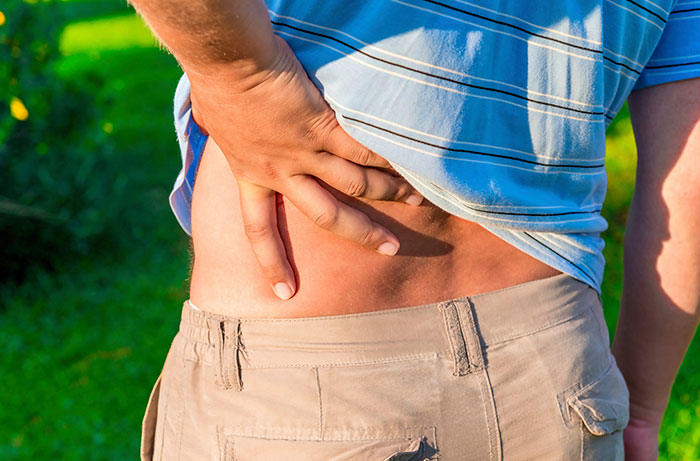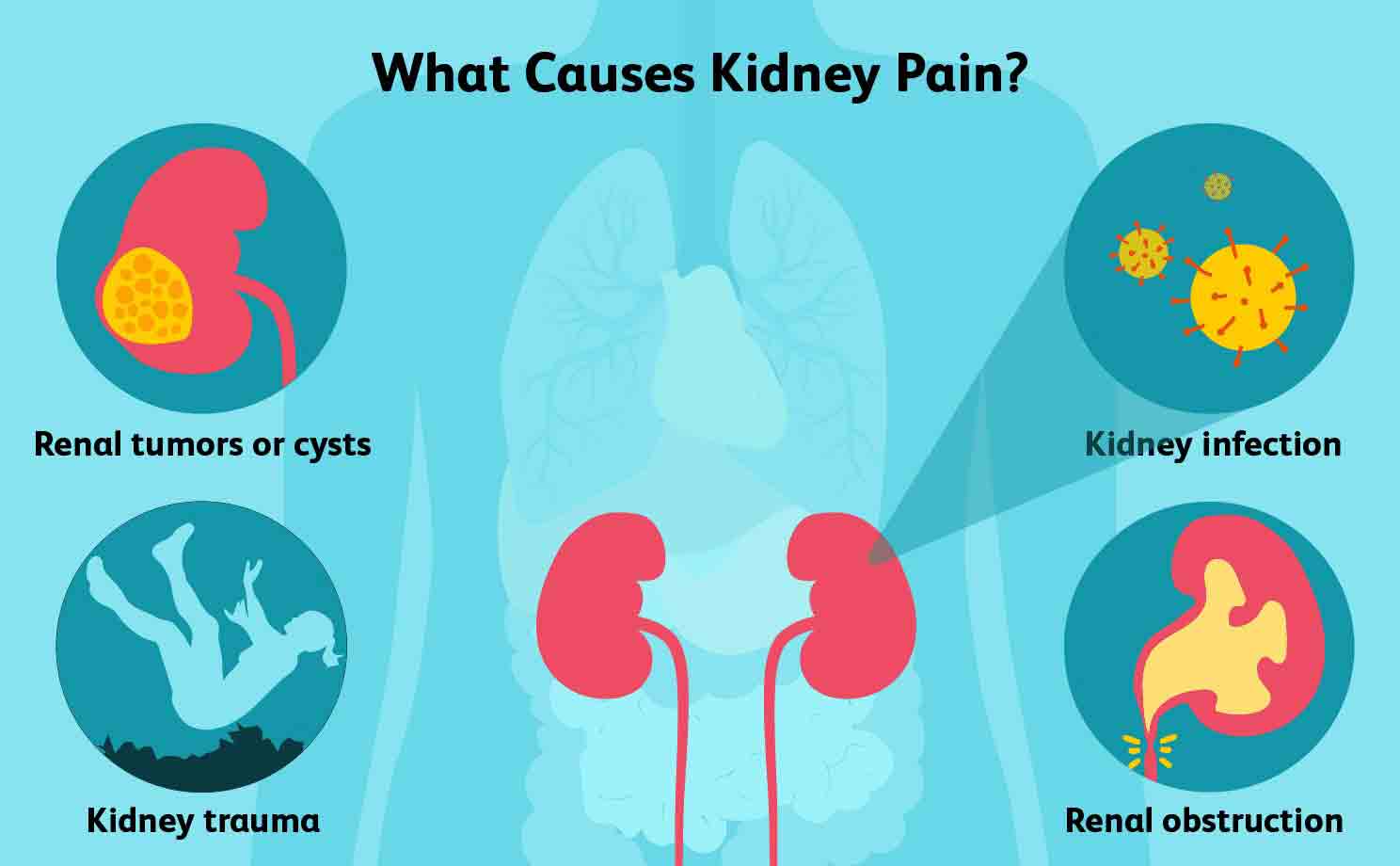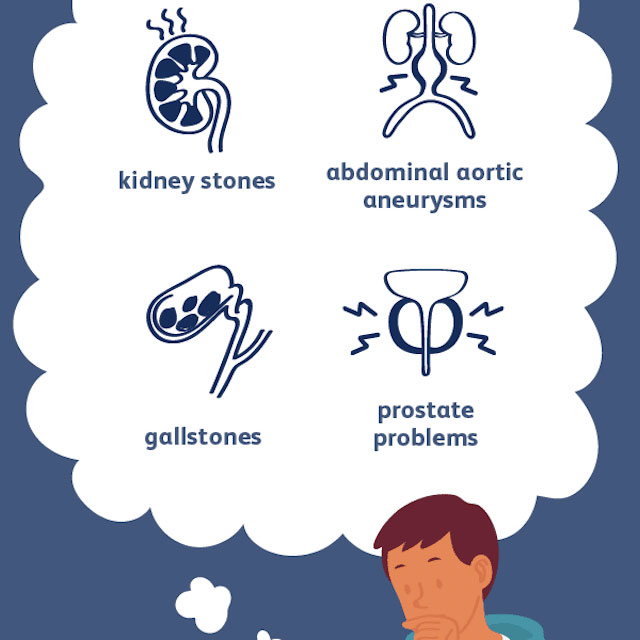WHAT IS KIDNEY PAIN?
Know the causes of kidney pain to recognize kidney pain from these symptoms and get treatment soon.
Kidney pain can be due to many reasons. Ignoring this pain can also lead to serious kidney related diseases. In such a situation, it becomes important to know about the causes, symptoms and treatment of pain.

ANATOMY OF KIDNEY
Kidney is a very important organ in the shape of a bean present on both sides of the spine, under the ribs and behind the stomach. There are two kidneys in the body and each kidney is about 4 or 5 inches long.
The main function of the kidney is to clean and filter the blood. In addition, it removes toxins from the body, regulates the body’s fluid balance and maintains the correct level of electrolytes.
Many times throughout the day, all the blood of the body passes through the kidneys. There are about millions of tiny filters in both kidneys, which are called nephrons.
Sometimes only 10 percent of the kidney functions, for which there are neither any symptoms nor any problem. If the blood flow to the kidney stops, the chances of kidney failure increase.
Sometimes some people have pain in the spine, ribs, waist, abdomen, which they ignore. It can be kidney pain. Kidney pain is a serious problem, for which there can be many reasons.

CAUSE OF KIDNEY PAIN
There can be many reasons for having kidney pain. The kidney removes excess fluid and waste materials from the body.
Due to the place where the kidney is located in the body, sometimes it becomes difficult to differentiate between kidney pain and back pain.
Sometimes there may be pain in both kidneys or only one kidney. In such a situation, you can identify due to the following reasons that you have kidney pain:
- Obstruction of the blood vessels of the kidney
- Urinary Tract Infection (UTI)
- Kidney wound
- Kidney stone
- Kidney infection
- Polycystic Kidney Disease
- Blood clots in the kidney
- Bleeding in kidney
- Kidney trauma
- Renal Tumors or Cysts
MAIN AND COMMON CAUSES OF KIDNEY PAIN
In kidney problems, you may have pain in the upper or middle part of the back. Some of the main causes of kidney pain include-
- Kidney or urinary tract stones
- Any serious kidney infection such as Pyelonephritis
- Polycystic kidney disease, PKD
- Blood clots in kidney
- Hemorrhage in kidney
- Blockage of kidney blood vessels
- Lesion in the kidney
- Kidney Pain

SYMPTOMS OF KIDNEY PAIN
- Abdominal pain on both sides and back
- Blood in urine
- Frequent urination
- Pain while urinating
- Foamy urine
- Bladder infection
- Vomiting and nausea
- Fever, chills
- Dizziness, feeling tired
- Bad breath
- Rash
- Metallic taste in the mouth
- Feeling short of breath
- Swelling up
TREATMENT OF KIDNEY PAIN: KNOW THE CAUSE AND GET TREATED
The treatment of kidney pain depends on its cause. For this, the doctor first tries to identify the problem through a urine test.
Ultrasound is also done, so that the causes of kidney pain can be detected properly. Treatment also includes MRI of the pelvis or abdomen. Treatment starts only after the test reports are received.
For this you may have to take medicines. If there is kidney pain due to bacterial infection, then the doctor also gives antibiotics to consume regularly.
PREVENTION OF KIDNEY PAIN
If you have persistent pain on both sides of the abdomen and are seeing the above-mentioned symptoms, then it is important to consult a doctor at the right time to avoid any serious condition.
Kidney pain can sometimes be mild, sometimes very severe. The intensity of pain depends on its cause.
The pain can also intensify due to kidney stones or any infection. By starting the treatment at the right time, any serious disease related to the kidney can be avoided.
TIPS TO DEAL WITH CHRONIC KIDNEY PAIN
- If you drink less water, then increase your water intake daily. Drink other fluids as well.
- Kidney pain can also be reduced by drinking green tea.
- Drinking basil juice mixed with water is also beneficial. Especially, when there is pain due to kidney stones.
- Drinking lemon water also reduces pain.
- If you have pain in the lower part of the abdomen and waist, then you can also compress with a hot water bag.
- Include citrus fruits in the diet.
- Consume parsley and cranberry juices.
LOCATION OF KIDNEY PAIN
Kidney pain is one of the most severe pains that a person can experience. It is felt in a particular place or towards one side. Kidney stones are the most important and common cause of kidney pain.
It is important to differentiate it from other causes of back pain. In this article, you will get the answer and treatment of every question related to pain due to any disease or damage in the kidney.
WHERE DOES KIDNEY PAIN OCCUR?
In our body, the kidney is located towards the back and is located under our ribcage. The kidney is more towards the back part. Therefore, if there is a problem in the kidney, then the kidney gives this indication in the form of pain.
Your pain symptoms can help you figure out what is causing the pain. This pain can be mild or severe, the intensity of the pain depends on the severity of the problem, and kidney pain feels like a twisting pain. The pain may intensify if there is a kidney infection or stone.
It does not change when the condition changes and sometimes gets better on its own without treatment. It can compress the genitals of both women and men, depending on the cause of this pain.
Due to which symptoms like blood in urine, fever, burning sensation in urine, etc. Apart from this, if the cause of this pain is not detected and treated, then this pain can come back within a few hours or a few days.
HOW IS KIDNEY PAIN DIFFERENT FROM BACK PAIN?
The pain of kidney problems usually occurs below the rib cage and on both sides of the spine. It feels as if the center of pain is deep inside the body.
This pain can be felt in both or one side, depending on the problem of the kidney, whether the problem is in one kidney or both kidneys.
Kidney pain usually starts from the sides of the back, can spread to the abdomen, thighs and lower abdomen i.e. the genitals.
In addition, back pain is common, with one study finding that approximately 80 percent of adults experience low back pain at some age or stage in their lives.
The main cause of back pain is thought to be problems affecting the muscles, bones, or nerves in the back. The severity of the pain depends on the problem.
Sometimes it becomes difficult to differentiate between kidney pain and back pain, after which the specialist has to take his own experience and determine the cause of the pain through scanning, blood and urine tests.
TESTS FOR KIDNEY PAIN
Some tests are needed to identify the problems or diseases due to which the patient has to face kidney pain. Often kidney pain appears along with burning urination (“blood in urine”) and blood in urine.
After recognizing the disease, your specialist will do some tests according to your symptoms to treat it. can say. Know what are the tests and tests done to identify kidney problems-
- Urinalysis – is a simple test through which it is detected that there is no kidney infection.
- Serum creatinine, blood urea nitrogen test (Serum creatinine, BUN test) – Generally, creatinine may be normal even in severe kidney pain. If the blood creatinine level rises then it indicates a serious kidney infection. The blood urea nitrogen (BUN) test measures waste products and their amounts in the blood.
- Urine culture test – This test is usually done to detect the bacteria causing urinary tract infection.
- USG-KUB or CT-KUB Scan – Abdominal and KUB (Kidney, uterus, and bladder) ultrasound scan is done to see the presence of a kidney in the body. If your specialist needs a CT scan / X-ray to know other information.
TREATING THE UNDERLYING CAUSE OF KIDNEY PAIN
The treatment of kidney pain depends on what is causing the pain. To find out these reasons, the specialist can give proper treatment after finding out the cause like-
Pain relief drugs (NAISDs) are given to treat the stones, and antibiotics to prevent infection. Apart from this, surgery etc. can also be advised for permanent treatment of stones.
Kidney infections such as pyelonephritis can be treated with antibiotics.
